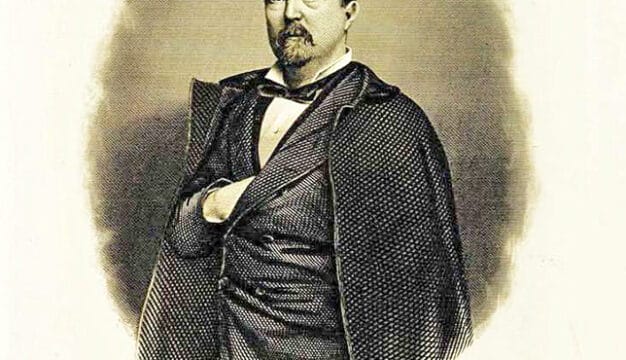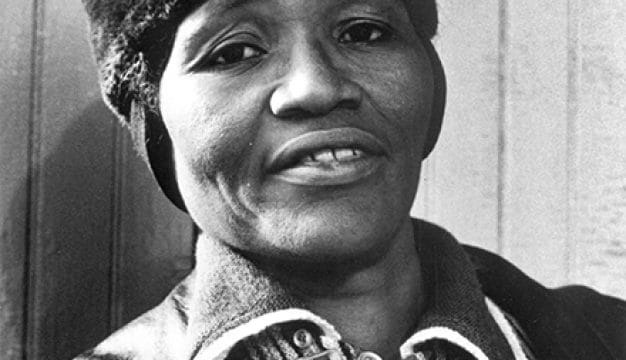Rosa Parks
Rosa Parks (1913-2005) is one of the most enduring symbols of the tumultuous civil rights era of the mid-twentieth century. Her 1955 arrest in Montgomery for refusing to give up her bus seat to a white man sparked the Montgomery Bus Boycott and set in motion a chain of events that resulted in ground-breaking civil rights legislation and helped to bring Martin Luther King Jr. to the forefront as the movement’s leader. Parks continued to work for civil rights causes during her entire life and was awarded the nation’s highest honors for her role in the movement.
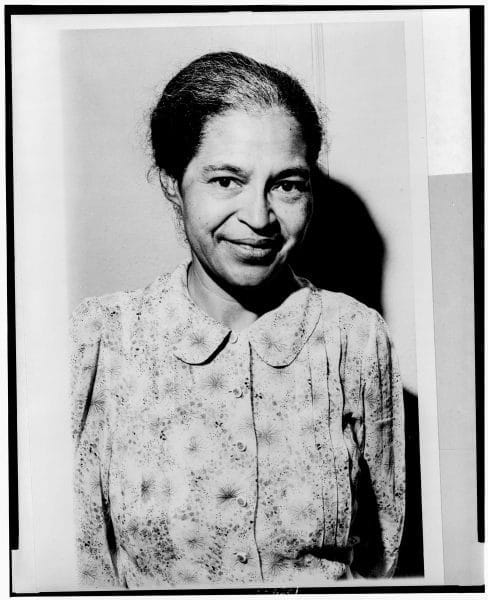 Rosa Parks
Rosa Louise McCauley was born in Tuskegee on February 4, 1913, to James McCauley, a carpenter and stonemason, and Leona Edwards, a teacher. She spent much of her childhood living with her maternal grandparents in Pine Level, a small town in southeast Montgomery County. There, she began her education in an all-black school with a single teacher serving all 50 students. In 1924, 11-year-old McCauley enrolled in the Montgomery Industrial School for Girls, which offered a vocational curriculum of cooking, sewing, and housekeeping under the instruction of northern whites. Family illnesses forced McCauley to quit school at age 16, when she began cleaning houses for white people and taking in sewing. At age 19, she married Raymond Parks, a barber from Wedowee, Randolph County. In the early 1940s, Parks became active in the Montgomery chapter of the National Association for the Advancement of Colored People (NAACP), serving as its secretary and teaching young people about their rights and responsibilities as U.S. citizens. Through her work as a seamstress, Parks came into contact with white civil rights activists Clifford and Virginia Durr, and in the summer of 1955 they sponsored a week-long stay for her at the Highlander Folk School in Tennessee. The school had been founded in 1932 as a training facility for social activists, and there Parks learned effective strategies to protest segregation, including picketing methods and guidelines for establishing citizenship training schools to help people pass voting tests.
Rosa Parks
Rosa Louise McCauley was born in Tuskegee on February 4, 1913, to James McCauley, a carpenter and stonemason, and Leona Edwards, a teacher. She spent much of her childhood living with her maternal grandparents in Pine Level, a small town in southeast Montgomery County. There, she began her education in an all-black school with a single teacher serving all 50 students. In 1924, 11-year-old McCauley enrolled in the Montgomery Industrial School for Girls, which offered a vocational curriculum of cooking, sewing, and housekeeping under the instruction of northern whites. Family illnesses forced McCauley to quit school at age 16, when she began cleaning houses for white people and taking in sewing. At age 19, she married Raymond Parks, a barber from Wedowee, Randolph County. In the early 1940s, Parks became active in the Montgomery chapter of the National Association for the Advancement of Colored People (NAACP), serving as its secretary and teaching young people about their rights and responsibilities as U.S. citizens. Through her work as a seamstress, Parks came into contact with white civil rights activists Clifford and Virginia Durr, and in the summer of 1955 they sponsored a week-long stay for her at the Highlander Folk School in Tennessee. The school had been founded in 1932 as a training facility for social activists, and there Parks learned effective strategies to protest segregation, including picketing methods and guidelines for establishing citizenship training schools to help people pass voting tests.
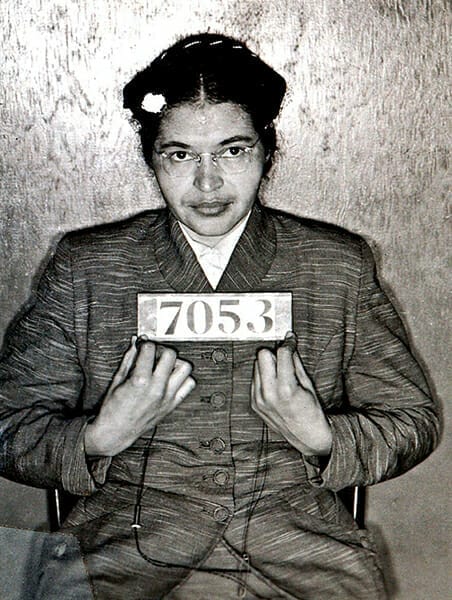 Rosa Parks Arrested
Upon her return, Parks redoubled her commitment to the civil rights community and its effort to overthrow the Jim Crow laws that regulated virtually every aspect of African Americans’ lives. On December 1, 1955, Parks’ convictions were put to the test. She boarded a crowded bus after work and took a seat. When a white man got on and was unable to find a seat in the whites-only section, the bus driver demanded that Parks and three other black passengers give up their seats. (All black passengers were required by law to leave the row, even if only one white passenger needed a seat.) Parks decided the time had come to take her stand; she refused to get up, and at the driver’s request two Montgomery police officers escorted her off the bus and to city hall to be arrested. Friends Clifford Durr and E. D. Nixon, former president of the Montgomery NAACP, bailed her out, and attorney and activist Fred Gray represented her in the subsequent trial, which resulted in a $10 fine.
Rosa Parks Arrested
Upon her return, Parks redoubled her commitment to the civil rights community and its effort to overthrow the Jim Crow laws that regulated virtually every aspect of African Americans’ lives. On December 1, 1955, Parks’ convictions were put to the test. She boarded a crowded bus after work and took a seat. When a white man got on and was unable to find a seat in the whites-only section, the bus driver demanded that Parks and three other black passengers give up their seats. (All black passengers were required by law to leave the row, even if only one white passenger needed a seat.) Parks decided the time had come to take her stand; she refused to get up, and at the driver’s request two Montgomery police officers escorted her off the bus and to city hall to be arrested. Friends Clifford Durr and E. D. Nixon, former president of the Montgomery NAACP, bailed her out, and attorney and activist Fred Gray represented her in the subsequent trial, which resulted in a $10 fine.
Although it was not her intention, Parks’s decision to violate the segregation ordinance triggered a year-long boycott of Montgomery’s buses by the city’s black population and prompted a challenge of the ordinance’s constitutionality in federal court. In December 1956, after the U.S. Supreme Court affirmed a district court’s ruling against segregation in Browder v. Gayle, Parks took a symbolic first ride near the front of a city bus. The successful boycott served as an inspiration to black communities throughout the nation and established Rosa Parks as the “mother of the civil rights movement.”
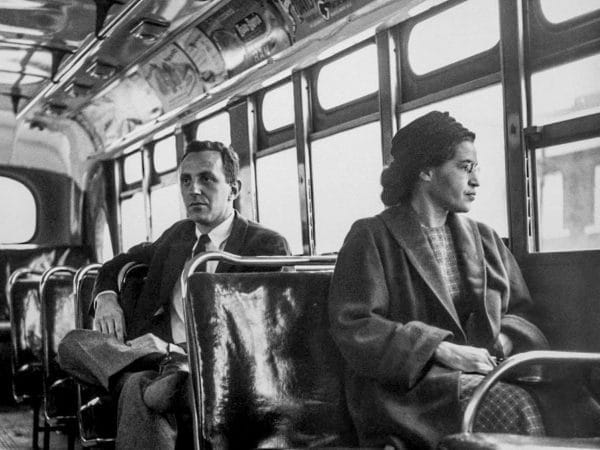 Rosa Parks’s Symbolic Bus Ride, 1956
Seeking a reprieve from the death threats and other pressures brought about by Rosa’s fame, the Parkses moved to Detroit in 1957 to be near her brother. Parks resumed work as a seamstress but remained an active spokesperson for the civil rights community. She was invited to attend the July 2 ceremony at which Pres. Lyndon Johnson signed the Civil Rights Act of 1964, banning segregation in public accommodations. The following year, she returned to Alabama to help lead the final leg of the Selma-to-Montgomery march in pursuit of voting rights in the South. In 1965, Parks joined the staff of U.S. Representative John Conyers, one of the leading African American members of Congress, and managed his Detroit office until her retirement in 1988. In 1987, Parks co-founded, with friend Elaine Eason Steele, the Rosa and Raymond Parks Institute for Self-Development, in honor of Raymond Parks, who died in 1977. The organization continues to promote education and life-skills training for young minority people.
Rosa Parks’s Symbolic Bus Ride, 1956
Seeking a reprieve from the death threats and other pressures brought about by Rosa’s fame, the Parkses moved to Detroit in 1957 to be near her brother. Parks resumed work as a seamstress but remained an active spokesperson for the civil rights community. She was invited to attend the July 2 ceremony at which Pres. Lyndon Johnson signed the Civil Rights Act of 1964, banning segregation in public accommodations. The following year, she returned to Alabama to help lead the final leg of the Selma-to-Montgomery march in pursuit of voting rights in the South. In 1965, Parks joined the staff of U.S. Representative John Conyers, one of the leading African American members of Congress, and managed his Detroit office until her retirement in 1988. In 1987, Parks co-founded, with friend Elaine Eason Steele, the Rosa and Raymond Parks Institute for Self-Development, in honor of Raymond Parks, who died in 1977. The organization continues to promote education and life-skills training for young minority people.
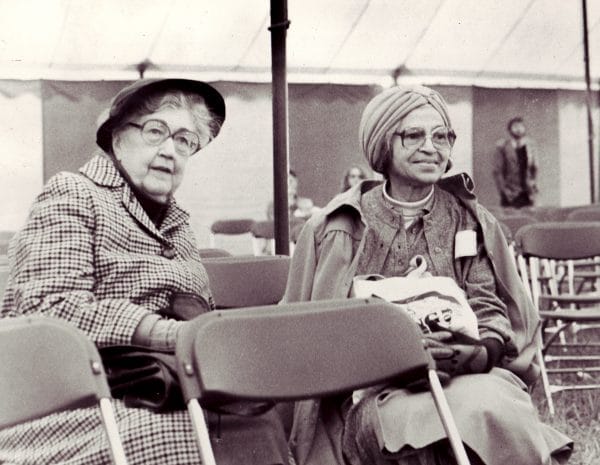 Virginia Durr and Rosa Parks
Parks received many awards and honors through the years. In 1996, Pres. Bill Clinton presented her with the Presidential Medal of Freedom. “When she sat down on the bus,” the president declared, “she stood up for the ideals of equality and justice and demanded that the rest of us do the same.” In 1999, she received the Congressional Gold Medal, and in 2001, despite her frail health, she journeyed to Montgomery for the opening of the Rosa Parks Library and Museum. The Southern Christian Leadership Conference, the civil rights organization founded by King and other civil rights figures, presents the Rosa Parks Freedom Award each year in her honor.
Virginia Durr and Rosa Parks
Parks received many awards and honors through the years. In 1996, Pres. Bill Clinton presented her with the Presidential Medal of Freedom. “When she sat down on the bus,” the president declared, “she stood up for the ideals of equality and justice and demanded that the rest of us do the same.” In 1999, she received the Congressional Gold Medal, and in 2001, despite her frail health, she journeyed to Montgomery for the opening of the Rosa Parks Library and Museum. The Southern Christian Leadership Conference, the civil rights organization founded by King and other civil rights figures, presents the Rosa Parks Freedom Award each year in her honor.
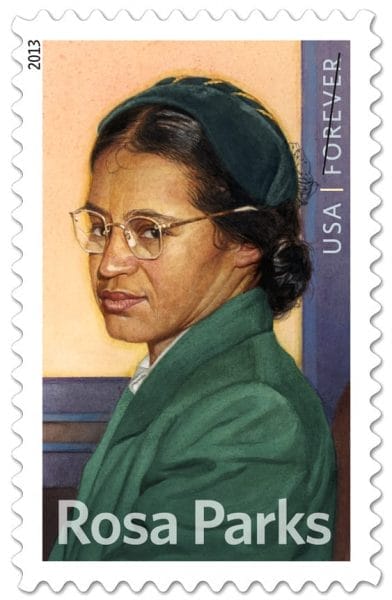 Rosa Parks Stamp
During her last years, Parks endured her share of controversy and pain. In 1994, she was robbed and beaten in her home by an African American intruder, who escaped with a small amount of cash. She later recalled asking her assailant if he knew who she was. The man admitted that he knew but did not care. In 1999, her lawyers sued the hip hop group OutKast for using her name in their song “Rosa Parks.” The suit, which was settled out of court in 2005, sparked concern among some of her relatives that her name was being exploited by her legal team. As her health declined, Parks became more reclusive. Rosa Parks died in Detroit on October 25, 2005. In 2018, the state of Alabama declared December 1 “Rosa Parks Day” to commemorate her accomplishments.
Rosa Parks Stamp
During her last years, Parks endured her share of controversy and pain. In 1994, she was robbed and beaten in her home by an African American intruder, who escaped with a small amount of cash. She later recalled asking her assailant if he knew who she was. The man admitted that he knew but did not care. In 1999, her lawyers sued the hip hop group OutKast for using her name in their song “Rosa Parks.” The suit, which was settled out of court in 2005, sparked concern among some of her relatives that her name was being exploited by her legal team. As her health declined, Parks became more reclusive. Rosa Parks died in Detroit on October 25, 2005. In 2018, the state of Alabama declared December 1 “Rosa Parks Day” to commemorate her accomplishments.
Further Reading
- Brinkley, Douglas. Rosa Parks. New York: Viking, 2000.
- Gray, Fred D. Bus Ride to Justice: Changing the System by the System, The Life and Works of Fred D. Gray. Montgomery, Ala.: Black Belt Press, 1995.
- Parks, Rosa. Rosa Parks: My Story. New York: Putnam, 1992.
